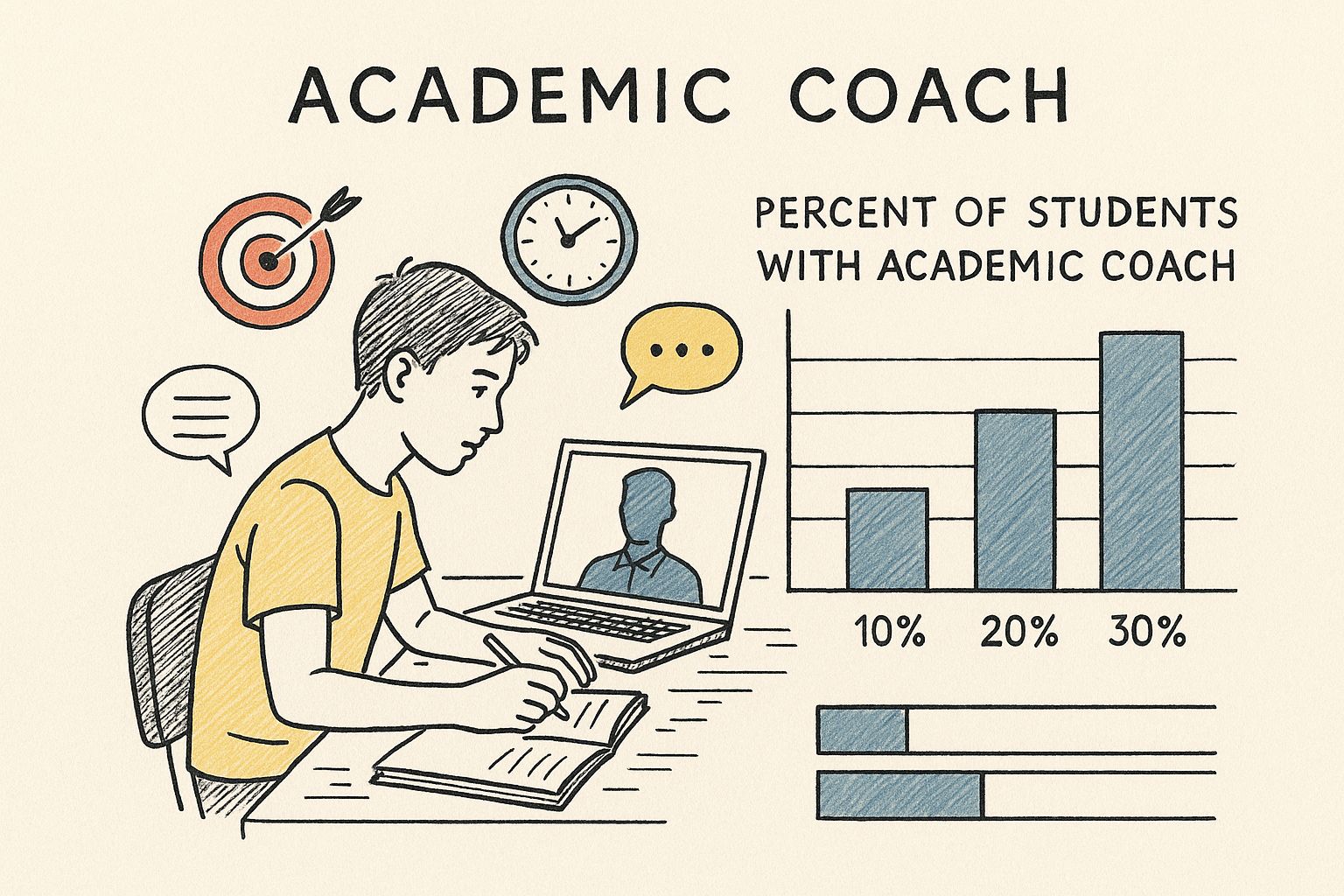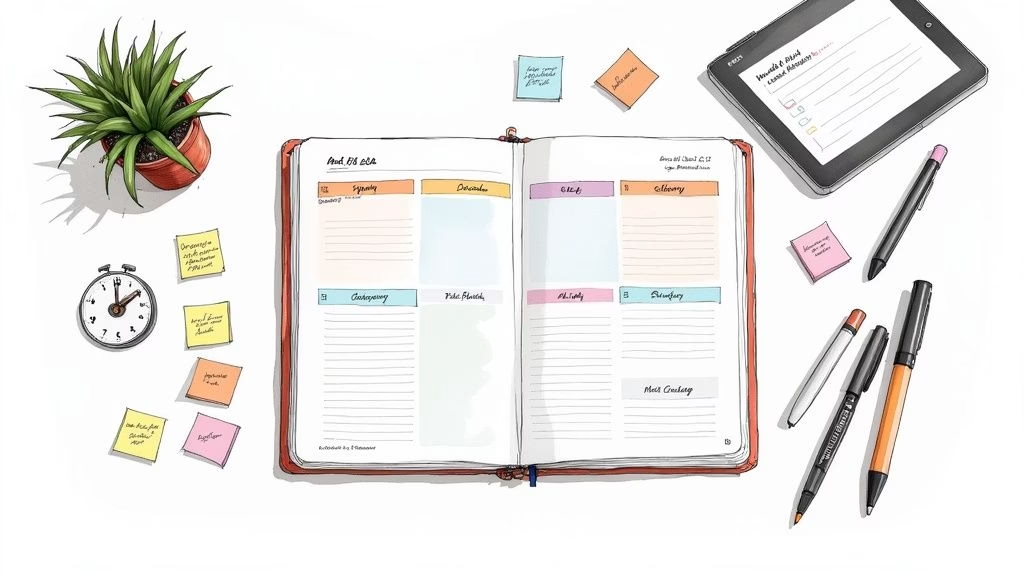A life coach for teens online isn't about fixing something that's broken. It's about providing personalized, forward-looking support in a space where teens already feel at home—online. This is different from therapy. The focus here is on building practical, real-world skills like resilience, time management, and motivation to help them handle the pressures of school and social life without getting overwhelmed.
Why Online Life Coaching for Teens Is a Game Changer
Let's face it: today's teens are juggling a ton. There are intense academic expectations on one side and the never-ending buzz of social media on the other. Sometimes, the usual support systems just don't click. That’s why so many families are finding that an online life coach is a more effective—and frankly, more realistic—solution.
The digital format is key. It meets teens right where they are, eliminating the headaches of scheduling conflicts or transportation hassles. This simple convenience makes it so much easier for them to actually show up and commit. The numbers back this up, too. The demand for coaching is climbing fast, with over 70% of coaching sessions expected to happen online by 2025. That’s a huge leap from just 50% before 2020, and it means specialized support is more accessible than ever. You can dig into this trend more over at Transformation Academy.
Bridging the Gap in Teen Mental Health and Motivation
It’s so important to see that a teen's struggles often go deeper than just grades. Procrastination isn't usually laziness; it's a sign of feeling completely overwhelmed. A good life coach helps uncover those root causes and gives teens simple, actionable strategies to get back on track.
They don't just hand out a to-do list. Instead, a coach helps a teen connect their daily actions to their bigger goals, which is what builds real, lasting motivation. This can be especially powerful for teen boys, who often need a trusted adult to talk to outside of the family. It creates a safe space to discuss pressures without feeling judged—a need that often goes unmet. Specialized resources, like groups focused on young men's mental health and dedicated coaching programs for teen boys, are designed to foster exactly this kind of open communication and growth.
This infographic gives a great visual of the core areas an online coach can help with, from setting goals to managing time.
As you can see, it’s all about creating a supportive ecosystem around the teen, targeting the specific skills they need to succeed in a comfortable, digital format.
Coaching vs. Therapy vs. Mentoring: What Your Teen Needs
It's easy to get these terms mixed up, but they each offer a different kind of support. Understanding the key differences is the first step in choosing the right path for your teen's specific challenges and goals. Are they struggling with past trauma, or do they just need a roadmap for the future? This table breaks it down.
| Support Type | Primary Focus | Best For |
|---|---|---|
| Coaching | Future-oriented; skill-building and goal achievement | Teens needing direction, motivation, confidence, or practical life skills. |
| Therapy | Past-focused; healing emotional wounds and trauma | Teens dealing with mental health conditions like anxiety or depression. |
| Mentoring | Guidance-oriented; sharing wisdom and experience | Teens looking for a role model in a specific field or life path. |
Ultimately, a coach helps build a game plan for the future, a therapist helps heal the past, and a mentor offers wisdom from their own journey. All are valuable, but they serve very different purposes. Research from the National Institute of Mental Health (NIMH) shows that nearly 1 in 3 adolescents will meet criteria for an anxiety disorder, highlighting the importance of having the right support system in place, whether that's coaching, therapy, or both.
A Simple Meditation Guide for a Quick Reset
One of the most practical tools a coach can offer is mindfulness. When stress kicks in and procrastination takes over, even a two-minute meditation can completely reset the brain. It sounds simple, but it works.
Here’s a quick guide you can share with your teen:
- Find a quiet spot. Sit in a chair with your feet on the floor. Just get comfortable.
- Close your eyes. Or just look down. Take a slow, deep breath in through your nose and let it out through your mouth.
- Focus on your breath. Don't try to change anything. Just notice the feeling of the air coming in and going out.
- Acknowledge thoughts. Your mind is going to wander—that's normal. When it does, just notice the thought without judgment and gently bring your focus back to your breath.
- Stay for two minutes. That’s it. Starting small makes it an achievable habit that can grow over time.
This tiny practice is huge for building self-awareness and learning how to manage those big, overwhelming feelings. It’s a tool they can pull out of their back pocket anytime, anywhere.
How to Find the Right Online Coach for Your Teen
Finding the right life coach for teens online isn’t about finding the person with the most impressive resume. It's about finding the right connection. The relationship your teen builds with their coach is the absolute foundation for any real, lasting change. That means your search needs to go way beyond a list of certifications and dig into personality, coaching style, and genuine rapport.
It's no surprise that more families are looking into this. One survey found that 35% of Gen Z would consider hiring a life coach for support with things like career decisions and managing stress. As coaching becomes a more common tool for teens, knowing how to choose the right one is more important than ever.
Look Beyond the Website
A slick, professional website is great, but it tells you nothing about how a coach actually connects with a teenager who’s feeling stuck or unmotivated. The truth is, anyone can call themselves a coach, so it’s on you, the parent, to do a little digging. You're looking for someone who has both the professional chops and, just as importantly, the right personality to click with your kid.
When you're checking out a potential coach, think about their background and how they approach their work:
- Real Experience with Teens: Have they specifically worked with teenagers on the exact issues your child is facing, like procrastination, social anxiety, or a total lack of motivation for school? General life coaching is not the same thing.
- Authentic Testimonials: Don't just scan for glowing reviews. Look for testimonials from other parents that describe the process and the relationship their teen had with the coach. A review that says, "My son was totally shut down, and Coach X found a way to get him talking about his goals" is worth ten generic five-star ratings.
- Professional Standards: The coaching industry isn't heavily regulated, which is why this matters. Does the coach belong to a professional organization or follow a clear code of ethics? This shows they’re serious about their craft and are committed to a high standard of accountability.
The Consultation Call Is Your Interview
That first free consultation call? It’s the single most important tool you have for vetting a coach. This is your shot to ask the tough questions and get a real feel for their coaching philosophy and whether their style is going to work for your teen.
Don't be afraid to be direct. Instead of a vague question like, "How do you help with motivation?" get specific. Try something like, "Can you walk me through an example of how you'd work with a teen who is completely unmotivated and failing their classes?" Their answer will reveal their actual methods, not just their talking points.
Here are a few questions I always recommend parents ask:
- "What's your process for building trust with a teenager who might be resistant to coaching in the first place?"
- "How do you keep parents in the loop while still respecting the teen's privacy and creating a safe space for them?"
- "What does a typical session actually look like? Is it structured with exercises, or is it more of a conversation?"
- "How do you measure progress? What does 'success' look like when you're working with a teen?"
Listen for answers that are specific, confident, and centered on partnership. And while you're weighing your options, it can also be helpful to explore whether online coaching or finding a local life coach for teens is the better fit for your family's unique situation.
Parenting Tip: When you talk to your teen about this, frame it as a partnership. Use language like, "Let's find someone who can be on your team to help you tackle these challenges." This completely shifts the dynamic from "we need to fix you" to "we're building your support system."
Involve Your Teen in the Final Decision
This is the non-negotiable part. At the end of the day, your teen is the one who has to show up and do the work. If they don't feel comfortable with the coach, it’s a non-starter. Forcing a connection will almost always backfire.
Once you’ve narrowed the list down to two or three coaches you feel good about, bring your teen into the process.
Set up a short, informal chat for your teen with each of your top picks. This isn't another interview; it's a simple "vibe check." Let them see who they feel most comfortable with. Afterward, ask them open-ended questions like, "Who did you feel you could talk to the easiest?" or "Who seemed to really 'get' what you're dealing with?"
Giving them the final say is the best way to get their buy-in. It makes them an active partner in their own growth, which is the whole point of coaching in the first place.
Boosting Motivation and Conquering Procrastination
When your teen is constantly putting off homework or just seems totally checked out, it’s easy to jump to conclusions. Laziness is the first word that comes to mind for many parents. But from my experience, procrastination is almost never about laziness—it's a coping mechanism.
It’s often a symptom of something deeper, like feeling overwhelmed, anxious about failing, or just plain disconnected from the point of it all. A study in JAMA Pediatrics found that nearly half of adolescents report symptoms of a mental health disorder, with school pressure being a major factor.
A life coach for teens online gets this. The first move isn't to enforce a stricter schedule or lecture them about responsibility. It’s to dig in and figure out the why behind the behavior. Are they terrified of not getting a good grade? Is the material genuinely too hard? Or do they just not see how factoring polynomials has anything to do with their actual life?
Just giving them a safe, supportive space to voice those struggles can be a massive relief. It’s the first real step toward building motivation that actually lasts.
Shifting Mindsets and Building Momentum
Once we know what’s really going on, we can start building practical skills. This isn’t about me telling them what to do; it's a partnership. We work together to break down that monster of a research paper into small, manageable chunks. Suddenly, it’s not an unclimbable mountain but a series of small, achievable hills.
This approach directly builds their executive functioning skills—the mental toolkit that lets us plan, focus, and manage multiple tasks. For teens who struggle here, especially those with ADHD, this kind of targeted support is a total game-changer. You can see more on how a specialized approach helps in our guide on finding a life coach for teens with ADHD.
Parenting Tip: Celebrate the small wins at home. Instead of only praising the final grade on a project, acknowledge the effort it took to complete the first outline or finish a single page of reading. This reinforces the process, not just the outcome, and helps build their confidence one step at a time.
This focus on small, consistent actions creates momentum. Every little task they complete delivers a small dopamine hit, slowly rewiring their brain to connect effort with a feeling of accomplishment. It's how "I can't" gradually becomes "I can."
Connecting Schoolwork to Real-Life Goals
One of the biggest hurdles for teens is feeling like school is pointless. A good coach helps bridge that gap. They work to connect what feels like a tedious academic task to something your teen actually cares about.
For instance, if your son is obsessed with video games and dreams of being a designer, his math homework can be reframed as the foundational skill he'll need to learn coding. That simple shift in perspective can be incredibly powerful.
It gives purpose to the grind. We also equip them with practical strategies to overcome procrastination, helping them develop real-world time management and self-discipline. The goal is to make school feel less like a chore and more like a training ground for the life they want to build.
Mental Wellness Resources for Teen Boys and Young Men
Teenage boys are often navigating a world of unspoken rules and pressures, where showing emotion can feel like a weakness. This environment can make it incredibly difficult for them to speak up when they're struggling, which can show up as issues with motivation, school performance, and their overall mental health. For guys in this spot, a life coach for teens online can create that crucial, private space to build emotional intelligence and resilience.
This kind of support is a game-changer, especially for young men who might not have positive male role models or a safe outlet to talk about what’s really going on. Dedicated support groups and specialized coaching are all about fostering a healthy sense of self, showing them that true strength is in self-awareness and vulnerability, not in bottling things up.
Finding the Right Support Systems
Connecting teen boys with the right resources is about more than just managing symptoms; it’s about building a foundation for lifelong emotional well-being. This proactive support helps them develop coping mechanisms before challenges become crises.
Here are some fantastic resources and communities dedicated to the mental health of teen boys and young men:
- The Jed Foundation (JED): A leading nonprofit that protects emotional health and prevents suicide for teens and young adults. They offer comprehensive resources for parents and teens to start conversations about mental health.
- HeadsUpGuys: This organization is laser-focused on supporting men in their fight against depression by providing practical tools, real information, and personal stories of recovery.
- Men’s Groups: Many communities offer local or online men's groups that provide a space for connection and peer support, helping young men see they are not alone. For more context on the feelings they might be navigating, exploring resources on understanding and coping with teenage angst can be really helpful.
This increased focus on specialized support makes sense. The global life coaching market was valued at $4.56 billion in 2024 and is expected to keep growing, partly because more people are seeking out niche services like stress management and guidance for young adults. You can check out more on these industry trends over at Life Purpose Institute.
Finding a supportive community is key. Below are a few organizations that provide excellent platforms and resources for young men to connect and find strength in shared experiences.
Key Support Resources for Teen Boys
| Resource Name | Focus Area | Type of Support |
|---|---|---|
| The Man Cave | Mental Health, Healthy Masculinity | Facilitated workshops, programs |
| Next Gen Men | Gender Equity, Positive Masculinity | Youth programs, community events |
| Movember | Men's Health, Suicide Prevention | Awareness campaigns, funding, resources |
| Young Men's Health | Physical & Mental Health | Online health information, guides |
These groups help normalize the conversation around mental health, making it easier for young men to reach out when they need it most.
A Simple Mindfulness Guide for Stressful Moments
One of the most powerful, practical tools a coach can offer is mindfulness. It’s not about emptying the mind, but about learning to observe your thoughts without getting swept away by them.
Here’s a simple, guided script any teen can use to hit the reset button.
- Find a Comfortable Spot: Sit upright in a chair with your feet flat on the floor. Rest your hands gently on your knees.
- Close Your Eyes: Take a slow, deep breath in through your nose, feeling your chest and belly expand. Hold it for just a second, then exhale slowly through your mouth.
- Focus on Your Breath: Don't try to control it. Just notice the sensation of the air moving in and out of your body. Feel its natural rhythm.
- Acknowledge Your Thoughts: Your mind is going to wander. That's what minds do. When a thought about school, friends, or anything else pops up, just notice it—like a cloud passing in the sky—and gently guide your attention back to your breath.
- Stay for Two Minutes: Set a timer for just two minutes to start. This short practice can make a huge difference in managing stress and regaining focus during a tough day.
Parenting Tip: Model this behavior. When you're feeling stressed, say something like, "I'm feeling a bit overwhelmed, so I'm going to take a few minutes to just breathe and reset." This normalizes self-care and shows your son that managing emotions is a healthy, proactive skill.
When we combine professional support, like a dedicated life coach for teen boys, with practical self-regulation tools and community resources, we give young men the confidence and skills they need to truly thrive.
Parenting Strategies to Support Your Teen's Journey
So, your teen has started working with a life coach. Your part in this journey isn't over—it's just shifting. You’re now a key part of their support crew, the person who can help reinforce the new mindsets and strategies they're building in their sessions.
Think of your involvement as a force multiplier. You have the power to help turn their progress into real, lasting change. But it’s a delicate balance. The goal is to be an ally without becoming their manager, a supporter without becoming a crutch. It’s about creating a home environment where the skills they learn with their life coach for teens online can actually take root.
Keep the Door Open, But Don't Force It
One of the trickiest parts is figuring out how to talk to your teen about their coaching. They need the space to build a trusting relationship with their coach, but you also want to show you're on their team.
Instead of hitting them with, "So, what did you talk about today?"—which can feel like an interrogation—try a softer, more open-ended approach.
- "How are you feeling about your sessions this week?"
- "Did anything cool come up for you in your session?"
- "Is there anything you’re working on that I can help you with at home?"
This approach respects their privacy while letting them know you’re genuinely interested and supportive. It frames the conversation around their journey, not a progress report, which builds trust instead of adding pressure.
Celebrate the Grind, Not Just the Goal
A good coach will help your teen break down huge goals—like finally getting their grades up or tackling procrastination—into small, doable steps. Your job at home? Celebrate the effort it takes to climb those steps, not just the view from the top.
When you see your teen start their homework without a reminder, or try out a new planner, point it out. A simple, "Hey, I saw you mapping out your week in that planner—that's an awesome strategy," can mean the world. It shows them you see their hard work, reinforcing that small, consistent actions are what really drive success.
Acknowledging effort over results helps your teen build intrinsic motivation. It teaches them that progress is a series of small, consistent wins, which is a vital lesson for navigating both school and life.
This is especially huge for teen boys and young men, who often feel this insane pressure to succeed without ever showing the struggle. Creating a space where it's safe to try and even fail is a game-changer for their confidence and resilience.
Get Good at Just Listening
Active listening sounds simple, but it's a skill. It’s more than just hearing words; it’s about tuning into the feelings behind them. When your teen shares something—a frustration or a win—put the phone away, make eye contact, and give them your undivided attention.
Fight the urge to jump in with solutions. Seriously. Sometimes, all they need is to feel heard.
- Reflect what you hear: "It sounds like you're feeling pretty buried by that history project."
- Ask clarifying questions: "What's the most stressful part about it for you?"
- Validate their feelings: "I get it. That's a lot to deal with. It makes sense you'd feel that way."
This simple act builds a powerful sense of psychological safety. It makes it far more likely they’ll come to you next time they're struggling, instead of bottling it up.
Practical Tools and Resources for Parents
Supporting your teen also means doing a little homework of your own. Understanding what’s going on in the world of teen mental health is crucial. With research showing that nearly one in six adolescents has dealt with a serious mental health disorder, being proactive is more important than ever.
Here are a few resources I often recommend to parents:
- The Jed Foundation (JED): They have some incredible guides for parents on how to talk to teens about mental health in a way that actually connects.
- Mindful.org: This site is packed with simple meditation guides and articles on mindfulness. You could even try practicing some of them with your teen to model healthy ways of managing stress.
- Men’s Groups & Communities: Organizations like HeadsUpGuys offer really valuable insights into the specific pressures young men are up against, helping you see their world a little more clearly.
When you combine these strategies at home with the focused support of a coach, you create a unified front. You're not just paying for a service; you're actively building an environment where your teen has every chance to thrive.
Your Questions About Teen Coaching, Answered
Deciding to bring a life coach into your teen's life is a big move, and it's totally normal to have a ton of questions. You're looking for the right kind of support, and feeling good about that choice is everything. Here are some of the most common questions I get from parents before they start.
How Is Coaching Different from Therapy?
This is the big one, and the difference is super important. Therapy is a clinical practice. It's designed to heal past trauma and treat mental health conditions like clinical anxiety or depression. A therapist often helps a teen understand the "why" behind their deepest emotional struggles.
Coaching, on the other hand, is all about action and looking forward. A coach partners with your teen to build real-world skills—things like managing their time, setting goals they actually care about, and finding their own motivation. We're focused on clearing the roadblocks they're facing right now so they can build the future they want.
While coaching absolutely boosts mental well-being, it's not a substitute for therapy if a mental health diagnosis is in the picture.
What Does an Online Coaching Session Actually Look Like?
Forget lectures. An online session is a one-on-one video call where your teen is in a comfortable, private space. It’s a real conversation. I use powerful questions and activities to help them get clear on what’s really going on.
Let's say procrastination is the main issue. A session might look like this:
- Getting to the root of it: Is the procrastination really about laziness, or is it a fear of failure? Is it feeling overwhelmed? We dig in to find the real barrier.
- Breaking down the giant task: We might take a massive school project and map it out into small, doable steps. Suddenly, it's not so scary.
- Setting a clear, winnable goal: The focus might be on just knocking out one of those small steps before we meet again.
The whole point is for them to leave the call with a concrete, actionable plan that builds momentum and, more importantly, confidence.
What Qualifications Should I Look for in a Teen Coach?
This is a critical question. The coaching industry isn't regulated like therapy, which means anyone can technically call themselves a coach. You have to do your homework to find someone with genuine expertise.
A great coach for teens should have:
- Specialized Training: Look for certifications or specific training in youth, adolescent, or young adult coaching.
- A Proven Track Record: They should have real, verifiable experience working with teens who are facing similar hurdles to your own.
- A Clear Code of Ethics: A professional coach operates with strict confidentiality and clear professional boundaries.
A big heart is a great start, but it's not enough. Effective coaching demands a real understanding of adolescent development, the psychology of motivation, and proven strategies to guide young people safely and effectively.
Don't ever feel shy about asking a potential coach about their qualifications, how they stay current in their field, and what they're doing to understand the unique challenges teens face today.
How Can I Support My Teen Boy’s Motivation at Home?
With teenage guys, motivation is almost always connected to a sense of purpose and autonomy. They need to feel like they're in the driver's seat and that what they're doing actually matters.
Here are a few things you can do at home to back up the work he's doing in coaching:
- Connect the Dots: Help him see how getting through a "boring" class connects to something he's genuinely passionate about. For instance, physics is the language of engineering, and algebra is the foundation of coding the video games he loves.
- Let Him Solve His Own Problems: When he gets stuck on homework or faces a challenge, fight the urge to jump in and fix it. Instead, try asking, "What's one small thing you could try next?" This builds the self-reliance he'll need for the rest of his life.
- Acknowledge the Effort, Not Just the Grade: For a lot of young men, just admitting they're struggling is the hardest part. Create a safe space by saying things like, "I know this is tough, and I'm really proud of you for sticking with it." This validates his hard work, which is way more powerful than just praising the final result.
Things like men's groups or other communities focused on young men's mental health can also be game-changers. They offer a sense of shared experience that's incredibly validating for teenage boys.
At Andrew Petrillo Life Coaching, we get these challenges because we've been there. We provide practical, real-world strategies to help teens build the motivation, confidence, and skills they need to win at school and in life. If you're ready to see your teen thrive, book a complimentary discovery call today.
























